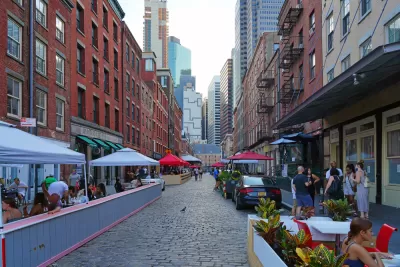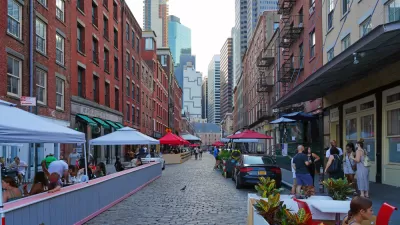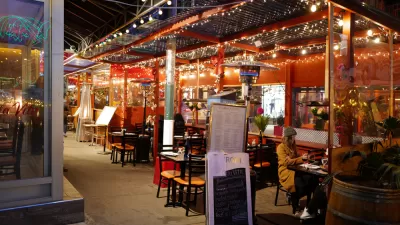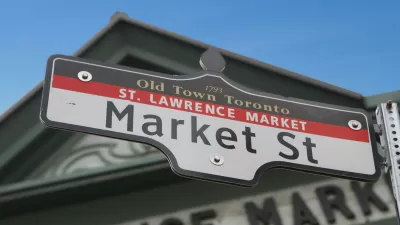Most business owners believe that they'd be out of business without on-street parking near their front door. The experience of New York City during the pandemic proves otherwise.

Business owners are most often some of the most vocal proponents of car-centric planning, opposing public transit, bike lanes, and the repurposing of parking out of a belief that any impediment to the delivery of cars to the front door of businesses will spell doom for bottom lines.
The belief of businesses in the supremacy of the automobile was tested during the pandemic, however, when stay at home orders left the streets empty and homebound residents in need of outdoor space to gather and socialize. Now a study about the effects of the Open Streets program implemented by New York City during the pandemic lends evidence to the contrary of many entrepreneurs' beliefs: businesses largely benefitted when streets were shut down to automobile traffic and parking spots were converted to dining spaces.
The “Streets for Recovery” report, published by the New York City Department of Transportation in partnership with Bloomberg Associates, “should put to rest a contentious debate over the future of the Open Restaurants program,” writes Julianne Cuba in an article for Streetsblog NYC. “It’s clear from the data that streets for people moseying through rather than car drivers rushing past are the best for businesses,” writes Cuba.
The city analyzed tax sales before and during the pandemic from bars and restaurants on five open streets — Ditmars Boulevard in Astoria, Pell and Doyers streets in Chinatown, E. 32nd Street in Koreatown, Fifth Avenue in Park Slope, and Vanderbilt Avenue in Prospect Heights — and found that businesses on open streets experienced more economic growth than those on comparable commercial streets in the same neighborhoods as well as the borough overall…
The report emerges as the City Council considers whether to limit the program only to warm weather months or to restrict outdoor dining only to the curbside lane. Department of Transportation Commissioner Ydanis Rodriguez is quoted in the article supporting the use of the full roadway in some places. Council Speaker Adrienne Adams is quoted saying dining should not be occurring in the roadway.
The NYCDOT report is not the first to make the case for the economic sense made by making space for business and activity in spaces previously reserved strictly for automobiles. A report from Toronto found that repurposed parking spaces generated $181 million in business in that city in 2021. The parking spaces otherwise would have generated $3 million in parking revenue.
FULL STORY: City’s ‘Open Streets’ Program Sparked Economic Growth During Pandemic, New Report Shows

Planetizen Federal Action Tracker
A weekly monitor of how Trump’s orders and actions are impacting planners and planning in America.

San Francisco's School District Spent $105M To Build Affordable Housing for Teachers — And That's Just the Beginning
SFUSD joins a growing list of school districts using their land holdings to address housing affordability challenges faced by their own employees.

Can We Please Give Communities the Design They Deserve?
Often an afterthought, graphic design impacts everything from how we navigate a city to how we feel about it. One designer argues: the people deserve better.

The EV “Charging Divide” Plaguing Rural America
With “the deck stacked” against rural areas, will the great electric American road trip ever be a reality?

Judge Halts Brooklyn Bike Lane Removal
Lawyers must prove the city was not acting “arbitrarily, capriciously, and illegally” in ordering the hasty removal.

Engineers Gave America's Roads an Almost Failing Grade — Why Aren't We Fixing Them?
With over a trillion dollars spent on roads that are still falling apart, advocates propose a new “fix it first” framework.
Urban Design for Planners 1: Software Tools
This six-course series explores essential urban design concepts using open source software and equips planners with the tools they need to participate fully in the urban design process.
Planning for Universal Design
Learn the tools for implementing Universal Design in planning regulations.
Borough of Carlisle
Smith Gee Studio
City of Camden Redevelopment Agency
City of Astoria
Transportation Research & Education Center (TREC) at Portland State University
City of Camden Redevelopment Agency
Municipality of Princeton (NJ)





























